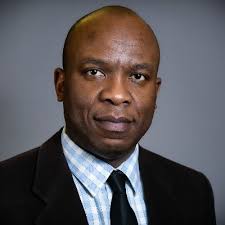Festus Adedayo Ph.D
“So, let us do a breakdown of Badenoch’s allegations. Is Nigeria broken? I recently saw a book entitled Leaders Eat Last written by Simon Sinek. It contains nuggets on how leaders, who are the highest ranking officers, should “be the last to fix their plate at mealtime in order to ensure the people in their command were fed and catered for.” Is that what Nigerian leaders/politicians do as compared to other saner climes? Do our presidents, ministers, governors, legislators and their allies, since 1999, as alleged by Kemi, turn public money into private piggy bank? Is an Accountant General of the Federation on trial for stealing N109 billion? Did a public servant build 753 duplexes in Abuja? Do we know what job Bola Tinubu has done between 1999 and now that makes him one of the richest Nigerians alive? Is our judiciary corrupt, fantastically corrupt, a la David Cameron? Have Nigerian leaders failed in the last 25 years? Is our country plagued by corruption? Isn’t the Nigerian school so badly run that students carry chairs to school? Should Britain be a dormitory for residue of the failure of Nigerian leaders? Is everything broken in Nigeria”?
This past Monday, Nigeria’s Vice President, Kashim Shettima, held the fèèrè (flute) and blew it admirably. However, bystanders listening to the rhythm of his flute didn’t know whether to cry or laugh. Moyo Okediji, Assistant Professor of Art at the Wellesley College, Massachusetts, in his “Art of the Yoruba” Art Institute of Chicago Museum Studies, (Vol. 23, No. 2) described the flute held by Shettima as a symbol of the trickster god Esu, also known as the divinity of the crossroads. According to Okediji, Esu was so powerful that he could help or hinder the craft and life of man. The fere was so influential in traditional Africa that it was equally a symbol of royal might. If you went to the palace of the Alaafin of Oyo during the reign of late Oba Lamidi Olayiwola Adeyemi 111, as you approached the palace court, traditional flutists demonstrated their craft in magnificent candour. As they blew the flute, their eyes popped out like an ostrich’s, cheeks inflated like the rotund belly of a toad.
It is the same with drums. Apart from the rhythm they provide, drums are communicative instruments. So, while blowing the flute and beating drums, the crafters are engaged in the powerful medium of communication. Oba Adeyemi once told me that, shortly after the Ooni of Ife, Oba Enitan Ogunwusi, was enthroned, he, Alaafin was with the Ooni at an event in Ile-Ife. Palace drummers, continuing the decades-long tiff between Oba Adeyemi and Ogunwusi’s predecessor, Oba Okunade Sijuwade, suddenly changed the tone of their drumming. They then began to drum out abusive messages to Alaafin with each descent of their sticks on the drum. Being ardent in the mastery of language of drums, Alaafin told me he immediately called the attention of Oba Ogunwusi to it. Ooni was apparently unschooled in drum language, and couldn’t penetrate the rain of expletives. “Kìlò fún awon onílù re” – warn your drummers – he told me he said to the Ooni to cease the tirades or he would storm out of the occasion.
The art and craft of flutists however arrest the attention of the audience who marvel at the beauty oozing out of their mouth. So, if a flutist is unfortunate to suffer from goiter, what the Yoruba call gègè, at the time he is blowing it, it will be double jeopardy for him. Goiter is an irregular growth at the thyroid gland which, as a result of its enlargement, makes its sufferer present with a big swelling on the neck. So, Yoruba say, the King who employed Onígègé– goiter patient – as a flutist will have a large audience of scorners watching his craft. In which case, the object to watch by the audience will be two – the flutist’s enlarged neck and the rhythm that comes out of the flute.
British-born Nigerian UK Conservative Party Leader, Kemi Adegoke, otherwise known as Kemi Badenoch, has been in the eye of the storm for her unflattering comments about Nigeria. Kemi became British as a result of her birth in 1980 at St. Teresa’s Private Hospital in London. Her professor of physiology mother, who taught at the University of Lagos and in America, had brought her pregnancy for birth in the UK on January 2 of that year before the British Nationality Act 1981 abolished the automatic birthright citizenship in England. She got married to Hamish, British banker. Since her climb up the ladder of British politics, Kemi has regaled Britons with the “very tough upbringing” she had in Nigeria, especially how it was enveloped by fear and insecurity. She had said, “This is my country. I don’t want it to become like the place I ran away from. I grew up in Nigeria, and I saw firsthand what happens when politicians are in it for themselves, when they use public money as their private piggy banks, when they pollute the whole political atmosphere with their failure to serve others… I saw poverty and broken dreams. I came to Britain to make my way in a country where hard work and honest endeavour can take you anywhere. I grew up in a place where fear was everywhere. You cannot understand it unless you’ve lived it. Triple-checking that all the doors and windows are locked, waking up in the night at every sound, listening as you hear your neighbours scream as they are being burgled and beaten, wondering if your home would be the next.” Apart from insecurity, Badenoch has consistently described Nigeria as a country plagued by corruption. Her family was said to have resided in the harsh middle-class nieghbourhood of Surulere in Lagos, while she schooled at the Lagos International School.
But, like an obstinate or deaf King’s flutist afflicted with onígègé, Shettima didn’t care about the embarrassing swelling on his neck. In the process, both his message and the affliction on his neck became a laughing stock for the global audience. During a speech on migration in Abuja last week, Shettima was quoted to have said that the Bola Tinubu government was “proud” of Badenoch, “in spite of her efforts at denigrating her nation of origin.” However, Shettima said, “She is entitled to her own opinions; she has even every right to remove the ‘Kemi’ from her name but that does not underscore the fact that the greatest black nation on earth is the nation called Nigeria.” Continuing, the VP compared Badenoch’s unpatriotic treatment of her country of birth to that of Rishi Sunak, her predecessor, who became UK’s first Prime Minister of Indian heritage and noted that, Sunak was that “brilliant young man” who “never denigrated his nation of ancestry”.
Badenoch’s office did not allow the melody from the “Onígègé onifere” – the flutist with goiter – to subside. It responded accordingly.”She (Badenoch) is the leader of the opposition and she is very proud of her leadership of the opposition in this country,” her spokesman told reporters. “She tells the truth. She tells it like it is. She is not going to couch her words.”
What we should ask Shettima and people of his persuasion is, was Badenoch wrong because she is Nigerian-born or she was wrong by the certitude or otherwise of her claim? We must get his beef right. In other words, is Badenoch’s reminiscing a painful recount and frustration with the stagnation of her country of birth, or a mere demonization? Why didn’t she say this about Ghana? It is simply because she has no affinity with the Kwame Nkrumah country. Why would Badenoch take pleasure in the destruction of her fatherland? Let us even agree that those snide comments were meant to demonize; are the comments true about Nigeria? If they are true, should they be glossed over or spoken of, peradventure, the runners of Nigeria, who can be typecast as in the same trove with the Ifeoma Okoye novel’s title, Men Without Ears, (1984) can turn a new leaf?
The only issue I have with Kemi is her excessive patronizing of the British. While she may be British, she is not English. People have cited John Fashanu, the British footballer’s travails in the hands of the British press when he landed in trouble. It reminds me of Ilorin Dadakuada music exponent, Odolaye Aremu, who sang about the “Adìye òpìpí”, a rare species of featherless hen which looks like the hawk. It came into the world with scant feathers. In a moment when the Opipi hen forgot herself and identity, she thought herself to be hawk, until she was torn into pieces by this carnivorous bird.
Today, there are two schools of thought on the travails Nigeria is grappling with. None of them can be considered less patriotic than the other. While one believes in the methodology of alarm for redemption and shaming the devil, the other subscribes to the tactic of domesticating the rot (k’á se egbò l’égbò ilé). In other words, whilst both agree that there is a cancerous sore on the leg of Nigeria, one believes finding remedy should be domesticated, while the other says remedy should be escalated to the whole world. At the intersection where they both meet, however, there is an agreement that their country is the proverbial sickly child. Should its condition be broadcast so that intervention could come, perhaps off-coast or, the condition be lidded, in which case, it could worsen and the child dies?
Whether you are a Nigerian living in Nigeria, outside its shores, a friend of Nigeria or observant of Nigeria from afar, the truth is that Nigeria isn’t really a good story. Tomes of publications have been reeled out about our country’s journey into its present stasis. Political scientists, historians and anthropologists have struggled to locate the gene of destruction inside the pod of Nigeria that is responsible for its poor harvest. One of the most apt capturing of the Nigerian situation was given by foremost political scientist, Eghosa Osaghae who, as title of his book, called it a Crippled Giant. Whenever I remember Professor Osaghae’s descriptive book title, I remember a line in the song of Ayinla Omowura, Yoruba Apala music songster. He sang, “ijó ńbe nínú aro, esè ni ò jé,” meaning that dance is innate within the bones of the crippled but they are disenabled by wobbly feet. Very many attempts to explain Nigeria have failed. Nigeria takes one step forward, ten steps backwards.
Let us even confine ourselves to the period between 1999 and now. For decades before military handover of power, Nigerians wasted blood, flesh, resources and hope believing that once the “enemy” – the military – retired into the barracks, an end had come to the underdevelopment of their country. However, 25 years down the ladder, we have lived ruinous years. The period is comparable to an attack by termites. Their comparison with termites here is instructive. Termites, over the centuries, are one of the greatest enemies of man. Wherever they strike, their presence is concealed and undetected, until they have visited the most rapacious and severest damage on timbers and woods necessary for man’s use. As the devastation goes on, while man sees a normal thin exterior layer of wood, at discovery, it is almost always too late to reverse the colossal ruins.
So, let us do a breakdown of Badenoch’s allegations. Is Nigeria broken? I recently saw a book entitled Leaders Eat Last written by Simon Sinek. It contains nuggets on how leaders, who are the highest ranking officers, should “be the last to fix their plate at mealtime in order to ensure the people in their command were fed and catered for.” Is that what Nigerian leaders/politicians do as compared to other saner climes? Do our presidents, ministers, governors, legislators and their allies, since 1999, as alleged by Kemi, turn public money into private piggy bank? Is an Accountant General of the Federation on trial for stealing N109 billion? Did a public servant build 753 duplexes in Abuja? Do we know what job Bola Tinubu has done between 1999 and now that makes him one of the richest Nigerians alive? Is our judiciary corrupt, fantastically corrupt, a la David Cameron? Have Nigerian leaders failed in the last 25 years? Is our country plagued by corruption? Isn’t the Nigerian school so badly run that students carry chairs to school? Should Britain be a dormitory for residue of the failure of Nigerian leaders? Is everything broken in Nigeria?
It will be difficult not to answer the above posers made by Kemi in the affirmative. Only recently, David Adeleke, a.k.a. Davido, the singing sensation, courted the ire of those who are too blind to see the Nigerian situation. He, too, had thrown mud (ògúlùtu) at runners of Nigeria from far away in the United States. The Tinubu government is all movement and no motion, what in street parlance is called “efisi”. While Sinek tells us that leaders eat last, Tinubu and his minions are growing rotund cheeks while this Christmas, Nigerians face the most barren festivity ever. The ruining gang has almost finished the food on the dining table while even crumbs are not left for the ordinary people.
Whilst this column was going to bed, Badenoch’s reply to Shettima’s tirade and her late father, Femi Adegoke’s interview with the BBC Yoruba, surfaced on the social media. Kemi had been quoted to have said, “I am Yoruba: I have nothing in common with the people from the north of the country, the Boko Haram where Islamism is.” If you listened to the elderly Adegoke’s interview, you will understand why Kemi’s bluntness and boldness are an inherited gene. In the interview, apparently conducted before 2022, the year of Adegoke’s passage, he said anyone who saw Tinubu becoming Nigeria’s president with the hope that he would right wrongs against the Yoruba, needed their head examined. In very sharp, deep Yoruba, Adegoke said the idea behind Tinubu’s “Yoruba” presidency was “òrò òpònú gbáà, tí kò m’ógbón wá” – it is a brainless argument. He based this on Tinubu’s silence as his kin were kidnapped and murdered by Fulani herdsmen whilst he mouthed the shibboleth of “gedegbe l’Èkó wà” – Lagos is non-aligned – all because of Lagos’ wealth. Adegoke believed that the 1999 constitution must be abolished if Nigeria wants to make any progress.
Again, Kemi, Adegoke’s daughter, has come under visceral attacks for her latest remarks. As usual, that comment is perceived on the social media from an ethnic filter. Igbo compare her with the novelist, Chimamanda Adichie and Hausa/Fulani see her comment as the usual superiority complex of the Yoruba. An examination of it will show that every word Kemi uttered was in line with her avant-garde opposition role in the British parliament and reflects her usual down-to-earth-ness. Is Kemi Yoruba as she claimed? Very correct! Does she have anything in common with any other part of Nigeria? Certainly, not! Should she have? Yes. Today, many Yoruba, rightly or wrongly, believe that “the Gambari” is the axis of evil in Nigeria. Kemi belongs to that persuasion. Is the North the epicenter of many of Nigeria’s current challenges, including Boko Haram and out-of-school children, the latter which gave birth to the former and the former which manifested from the Vice President’s home state, Borno State in 1999, especially under Shettima’s leader, Ali Modu Sheriff? Yes. Nigeria spends a considerable part of her budget fighting insecurity, almost 80 per cent of which is located in the north. So, should Kemi have couched her words so as to patronize the rulers of Nigeria? Certainly, not! If she did, she would not be an Adegoke’s daughter, the man whose friends nicknamed “Fariga” – disputation.
It is obvious that Shettima is the orange which attracted bystanders to pummel its mother, the orange tree, with stones and woods (omo osàn tíí kó póńpó bá ìyá è). He is also the King who employed the services of a flutist afflicted with goiter to sing his praise. The lesson therein is that challenged flutists should not blow the flute. Shettima’s Nigeria is the flutist’s goiter that attracts mockery of the world. Let Shettima and his boss remove the goiter from Nigeria’s neck by doing right with the power given them.
To Kemi and her deification of the British system: Since she affirmed she is Yoruba, I enjoin her to listen to the counsel of her people to the “Adìye òpìpí”. Because she has no feathers which help hens to fertilize their eggs, keeping such eggs warm and thereby producing offspring, Yoruba warn the Adìye òpìpí to lay controllable eggs which her scant feathers can fertilize. This is to enable her be a mother like other hens. I hope Kemi understands this wisdom of her forefathers?
Share your story or advertise with us: Whatsapp: +2347068606071 Email: info@newspotng.com













